 Burbank, CA – January 6, 2015: Today, Cinema Without Borders has announced the six nominees for HP’s Bridging The Borders Award at 2015 Palm Springs International Film Festival selected by Palm Springs International Film Festival Programers. The Bridging The Borders Award at the 2015 Palm Springs International Film Festival will be given to the most successful film in bringing the people of our world closer together.
Burbank, CA – January 6, 2015: Today, Cinema Without Borders has announced the six nominees for HP’s Bridging The Borders Award at 2015 Palm Springs International Film Festival selected by Palm Springs International Film Festival Programers. The Bridging The Borders Award at the 2015 Palm Springs International Film Festival will be given to the most successful film in bringing the people of our world closer together.
The six nominees for HP’s Borders Bridging The Borders Award are selected by Palm Springs International Film Festival programmers are: A FEW CUBIC METERS OF LOVE (Afghanistan), CHARLIE’S COUNTRY (Australia), Corn Island (Georgia), THREE WINDOWS AND A HANGING (Kosovo), TIMBUKTU (Mauritania) and TODAY (Iran). The Bridging The Borders Award winning film will be announced on Sunday, January 11th, at the Palm Springs International Film Festival award ceremony.
2015 HP’s Bridging the Borders Award, is offered by Cinema Without Borders and Prize provided and Award sponsored by HP Workstations. Director of the winning film will receive an HP ZBook 15 with a built-in HP DreamColor display, an approximately $3000 value. The second place winner for Cinema Without Borders’ “Bridging the Borders” award will receive a certificate for an upcoming Method Acting Intensive provided by The Lee Strasberg Theater & Film Institute in West Hollywood, valued at $2000. A jury of Cinema Without Borders decides the winners.
Nominees:
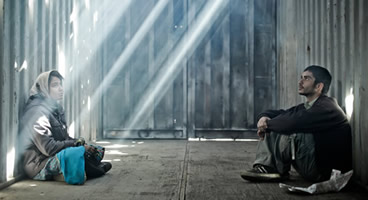 A Few Cubic Meters Of Love
A Few Cubic Meters Of Love
Chand Metre Moka’ab Eshgh
Afghanistan, 2014, 90 Minute Running Time
Additional Countries: Iran
Topic: Romance
Program: Awards Buzz
Language: Persian English Sub-Titles
Set in a shantytown on the outskirts of Tehran where a factory owner employs a horde of illegal Afghan workers, this affecting social issues drama centers on a forbidden relationship. Without belaboring the point, it also makes clear the (at best) second-class status Afghans have in Iran and how this rankles their pride. Orphaned teen Saber is part of an Iranian team laboring at a ramshackle scrap-metal workshop. Afghans work alongside Iranians, but they receive only half the salary of their local counterparts because they have no working papers. Moreover, if police come to inspect the facility, they must quickly grab their children and tools and hide in a drainage pipe, knee-deep in water. Saber is involved in a chaste but charming relationship with an Afghan girl, Marona. The two youngsters meet daily, hiding from prying eyes inside an empty, rusting container in the cargo yard next door, where they exchange gifts, share confidences and make plans for the future. But Marona fears the consequences if Saber were to ask her dour, ailing father for her hand. Winner: Best First Feature, Best Director, Fajr Film Festival.
DIRECTOR: Jamshid Mahmoudi
Producer: Navid Mahmoudi
Editor: Sepideh Abdolvahab
Screenwriter: Jamshid Mahmoudi
Cinematographer: Morteza Ghafouri
Music: Sahand Mehdizadeh
Principal Cast: Saed Soheili, Hassiba Ebrahimi, Nader Fallah, Alireza Ostadi, Masoud Mirtaheri
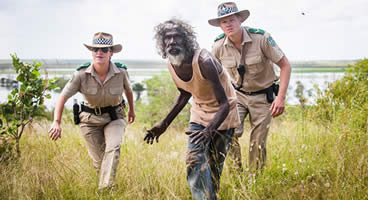 Charlie’s Country
Charlie’s Country
Australia, 2014, 108 Minute Running Time
Topic: Drama
Program: Awards Buzz
Language: English
Awards: Best Actor Award at Un Certain Regard for David Gulpilil, Cannes Film Festival
Aboriginal actor David Gulpilil made his screen debut in Nic Roeg’s Walkabout at the age of 16. Since then, he has limned indelible characters in numerous films. Now 60, the actor has teamed with director Rolf de Heer for a third time, to co-write and star in a hypnotically beautiful film that parallels his own troubled life and epitomizes the cultural dislocation that aboriginal people face in contemporary Australia. “The work that Rolf de Heer and David Gulpilil have done together in the past dozen years will take an exalted place in the history of Australian film…. Through The Tracker (2002), Ten Canoes (2006) and now this beautiful, culminating film, they have created a patchwork of Aboriginal stories, both spiritual and temporal. Charlie’s Country is much more brutal and possibly the best of the three. […] Gulpili’s extraordinary grace and physical ease is still there but his face is now ravaged by time and history, and some of the close-ups here are terribly haunting. These films are a powerful window on Aboriginal culture, made as a collaboration… In every sense, they’re a gift to the nation.” Paul Byrnes, The Sydney Morning Herald Winner: Best Actor, Un Certain Regard, Cannes Film Festival
Director will be attending screening(s).
DIRECTOR: Rolf de Heer
Producer: Nils Erik Nielsen, Rolf de Heer, Peter Djigirr
Editor: Tania Nehme
Screenwriter: Rolf de Heer, David Gulpilil
Cinematographer: Ian Jones
Music: Graham Tardif
Principal Cast: David Gulpilil, Peter Djigirr, Luke Ford, Peter Minygululu, Jennifer Budukpuduk Gaykamangu
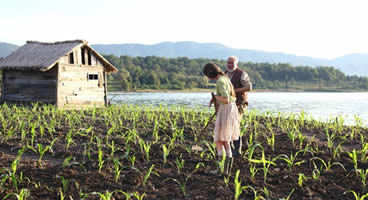 Corn Island
Corn Island
Simindis kundzuli
Georgia, 2014, 100 Minute Running Time
Topics: Drama, Seniors, War
Programs: Another Europe, Awards Buzz
Language: Abkhazian English Sub-Titles
Awards: KVIFF Grand Prize
The Inguri River forms a natural border dividing Georgia from Abkhazia. Tensions between the two nations have not abated since the war of 1992–93. This fable-like drama, shot on 35mm, captures the inexorable cycle of life in this harsh place, which is nevertheless full of wild, expressive beauty. Every spring the river brings fertile soil from the Caucasus down to the plains of Abkhazia and northwestern Georgia, creating tiny islands. The islands are havens for wildlife and occasionally also for local peasants who find them perfect for the cultivation of a crop to supplement their income. An old Abkhaz farmer builds a hut for himself and his teenage granddaughter on one of these islands. He ploughs the earth and together they sow corn. As his granddaughter blossoms into womanhood and the corn ripens, border patrol boats from the two feuding countries frequently pass, reminders of the dangers of cultivating in no-man’s land. “An astonishing feat of cinema presented with the utmost modesty… an unparalleled big screen experience.” Peter Debruge, Variety Winner: Best Film, Ecumenical Prize, Karlovy Vary Film Festival; Grand Prix, Split; Audience Award, Athens
Director will be attending screening(s).
DIRECTOR: George Ovashvili
Producer: Guillaume de Seille, Nino Devdariani, Eike Goreczka, George Ovashvili
Editor: Sun-min Kim
Screenwriter: Roelof Jan Minneboo, George Ovashvili, Nugzar Shataidze
Cinematographer: Elemer Ragalyi
Music: Iosif Bardanashvili
Principal Cast: Ilyas Salman, Mariam Buturishvili, Irakli Samushia, Tamer Levent
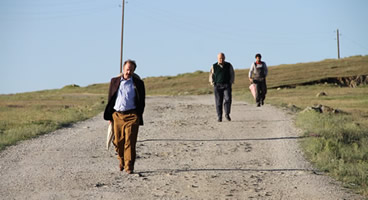 Three Windows and a Hanging
Three Windows and a Hanging
Tri dritare dhe nje varje
Kosovo, 2014, 93 Minute Running Time
North American Premiere
Topics: Drama, War, Women
Programs: Another Europe, Awards Buzz
Language: Albanian English Sub-Titles
Awards: Connecting Cottbus 2012, Best Pitch Award; Sarjevo Film Festival 2013, Cinelink’s Work in Progress
Set in a traditional Kosovar village a year after the war with Serbia, this finely written and directed drama provides a critical look at a patriarchal culture threatened by the knowledge that the enemy violated their women. When a local woman anonymously reveals to an international journalist that she and others were raped, the fallout from this once-repressed secret threatens to tear apart the fabric of village life. The action takes place in a scenic mountain enclave that is trying to rebuild after the war. When the article about the wartime rapes appears, the controlling mayor tells the local men that schoolmarm Lushe must be the source, and advises them to shun both her and her lad. While they are happy to comply because they believe Lushe has brought shame on them and their village, they can’t stop wondering about the identities of the three other raped women mentioned in the article. The choice of Three Windows as a foreign-language Oscar entry signals a coming to terms with something previously considered too shameful to discuss. Winner: Cineuropa Award, Sarajevo Film Festival
DIRECTOR: Isa Qosja
Producer: Shkumbin Istrefi, Mentor Shala
Editor: Agron Vula
Screenwriter: Zymber Kelmendi
Cinematographer: Gökhan Tiryaki
Principal Cast: Irena Cahani, Luan Jaha, Donat Qosja, Orik Morina, Aurita Agushi, Leonora Mehmetaj
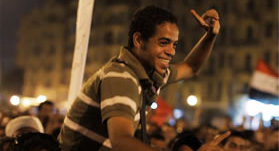 The Square (Al Midan )
The Square (Al Midan )
Egypt, 2013, 99 Minute Running Time
Additional Countries: USA
Language: Arabic English Sub-Titles
“The people demand the downfall of the regime!” This slogan echoed throughout Cairo’s Tahrir Square during the revolutionary fervor of the Arab Spring that gripped Egypt and enthralled the world. But who were the people shouting the slogan, what drew them to “The Square,” and, given the convoluted events that followed, what did it all mean, anyway?
These questions are addressed in the most cinematic way possible in Jehane Noujaim’s revelatory documentary. From Mubarak’s fall to the removal from power of Mohamed Morsi, The Square focuses mainly on the lives of three charismatic activists. No mere chronological recitation of events, The Square provides all the elements of a great movie: compelling, complex characters; a propulsive and unpredictable plot; a succession of eye-popping images; and, most important, an emotional core that connects with our own inner lives and gives the movie its universal appeal.
“[The Square] puts you in the center of the action to the extent that the protesters’ passion is so contagious, it seems to leap off the screen and into your heart.”
– Stephen Holden, The New York Times
Winner: Audience Awards, Sundance and Toronto Film Festivals
DIRECTOR: Jehane Noujaim
Producer: Karim Amer
Editor: Christopher De La Torre, Mohamed el Manasterly, Pierre Haberer, Stefan Ronowicz, Pedro Kos
Cinematographer: Muhammad Hamdy, Ahmed Hassan, Cressida Trew
Music: H. Scott Salinas, Jonas Colstrup
Principal Cast: Khalid Abdalla, Magdy Ashour, Aida Elkashef, Ramy Essam, Ahmed Hassan, Ragia Omran
Filmography: Rafea: Solar Mama (2012)
Storm from the South (2006)
Control Room (2004)
Startup.com (2001)
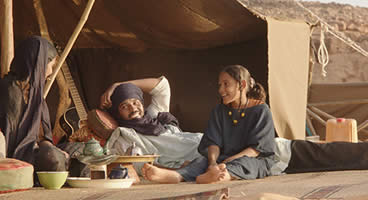 Timbuktu
Timbuktu
Le chagrin des oiseaux
Mauritania, 2013, 97 Minute Running Time
Additional Countries: France
Topics: African Interest, Political, Religion
Program: Awards Buzz
Language: French English Sub-Titles
Awards: Francois Chalais Prize, Ecumenical Jury, Cannes; Best Feature Film Award, Jerusalem Film Festival
Sissako’s first feature since 2007’s Bamako is a swift, forceful response to the brief but traumatic months in 2013 when foreign Jihadists seized control of the northern Malian city and imposed Sharia law (an incursion eventually repelled by the former colonial power, France). Unsurprisingly, the film shows little sympathy for the insurgents, whose zealotry rides roughshod over Timbuktu’s traditionally moderate Islamism. Women are instructed to cover their heads and hide their hands. Music and soccer is banned. Much worse is to come. Timbuktu is distinguished by Sissako’s supple navigation of a wide spectrum of individuals and moods (including a fair bit of humour and warmth) and refusal to caricature even men whose intolerance marks them as his polar opposite. His images have an easy, graceful flow and balance. This is often a very beautiful film to watch and listen to (DP Sofian El Fani shot Blue is the Warmest Color) even if it’s also difficult not to avert your eyes as the Jihadists exert their merciless, calamitous authority over the lives of proud Tuareg cattle herder Kadine and his family. Winner: Ecumenical Award, Cannes Film Festival
Director will be attending screening(s).
DIRECTOR: Abderrahmane Sissako
Producer: Sylvie Pialat, Abderrahmane Sissako
Editor: Nadia Ben Rachid
Screenwriter: Abderrahmane Sissako, Kessen Tall
Cinematographer: Sofian El Fani
Music: Amine Bouhafa
Principal Cast: Ibrahim Ahmed, Toulou Kiki, Abel Jafri, Fatoumata Diawara
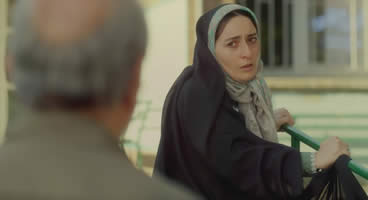 Today
Today
Emrouz
Iran, 2014, 87 Minute Running Time
Topics: Drama, Middle East
Program: Awards Buzz
Language: Persian English Sub-Titles
Awards: Rabat: Best Film, Audience Award and Best Performance by an Actor (Parviz Parastui)
At times it seems a chasm of cultural difference stretches on towards infinity between Iran and U.S.A. With her film Today, director and co-writer Reza Mirkarimi offers insight into what it is to be a pregnant woman without a man in that country. And this subtle yet profound offering somehow shrinks that daunting void down to something tender and relatable. Mirkarimi does not spell it out, but if you observe carefully and do the math, you can see trouble coming from the moment Youness spots a pregnant young woman standing across the street. She slips into his cab and asks him to take her to hospital. After a journey wrought with misinformation and rerouting, you just know Youness should move on. But he doesn’t. Her agenda is unclear and although danger seems to be lurking, his compassion pushes him forth. It is heart-rending to watch as a host of mis-perceptions conspire to condemn the kind-hearted and victimize the victim. And although this young woman is manipulative, in the end, one is left with the question, “What would I have done?” Winner: Best Film, Best Actor, Audience Award, Rabat Film Festival
DIRECTOR: Reza Mirkarimi
Producer: Reza Mirkarimi
Editor: Reza Mirkarimi
Screenwriter: Reza Mirkarimi, Shadmehr Rastin
Cinematographer: Houman Behmanesh
Music: Amin Honarmand
Principal Cast: Parviz Parastui, Soheila Golestani, Shabnam Moghadami

